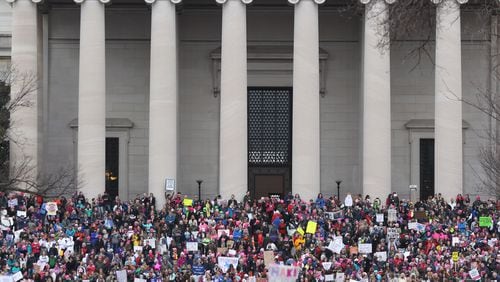For years, people have protested and rallied together in an effort to promote social change through marches and other public displays of solidarity.
From the NFL to civil rights advocates, Americans have joined forces to fight injustice this year. Next up is the March for Black Women, which will take place this weekend in Washington, D.C.
Don’t know much about the event? We’ve gathered the five things you should know.
What is the March for Black Women?
The march is a community-led movement that denounces violence and social inequality among women and LGBT members.
According to the site, protesters are fighting against “the propagation of state-violence and the widespread incarceration of Black women and girls, rape and all sexualized violence, the murders and brutalization of transwomen and the disappearances of our girls from our streets, our schools and our homes.”
The event is held in conjunction with the March for Racial Justice, a movement that fights for racial equity and justice of black and indigenous people.
»RELATED: The U.S. doesn’t even crack the top 15 best countries for women
When is it?
It's Saturday, Sept. 30 in Washington, D.C., and it will commence at Seward Square, move through Capitol Hill and end at the National Mall.
There will also be a host of sister marches occurring on the same day in other U.S. cities, including Birmingham, Cincinnati, Chicago and St. Louis.
How does this event relate to the Million Woman March?
The event will also commemorate the 20th anniversary of the Million Woman March, which occurred October 1997.
On Oct. 25, 1997, an estimated 300,000 people gathered on Ben Franklin Parkway in Philadelphia to promote unity and to examine what it means to be a black woman in America. Attendees congregated to pray, sing and hear speeches from influencers like Rep. Maxine Waters, D-Calif., and Winnie Madikizela-Mandela, former wife of South African President Nelson Mandela. Many of the attendees traveled from Chicago and New York to support the movement.
Can I attend this year’s event if I’m not a woman?
Yes. Anyone can attend regardless of gender, sexuality or race.
How many people are slated to attend the March for Black Women?
Nearly, 64,000 people have expressed interest in the combined events via the march's Facebook page. No officials estimates have been reported.



/cloudfront-us-east-1.images.arcpublishing.com/ajc/P7DYBH6TO7FEKG4SUXQQKADRXE.jpg)



